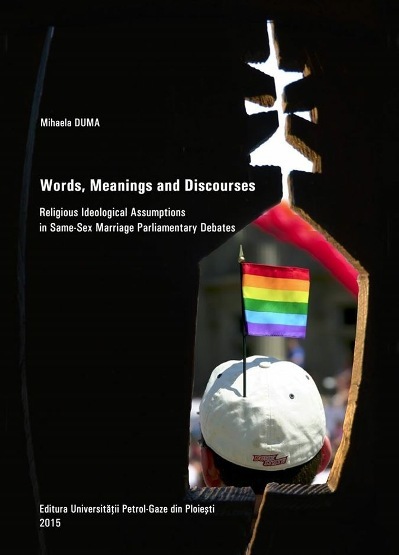Words, Meanings and Discourses Religious Ideological Assumptions in Same-Sex Marriage Parliamentary Debates
Words, Meanings and Discourses Religious Ideological Assumptions in Same-Sex Marriage Parliamentary Debates
Author(s): Mihaela Duma
Subject(s): Social Sciences, Language and Literature Studies, Gender Studies, Applied Linguistics, Sociology, Identity of Collectives
Published by: Universitatea Petrol-Gaze din Ploieşti
Keywords: delexicalisation; empty lexicon; collocation; colligation; collocational resonance; idiom principle; lexical priming theory; ideology; religion; same-sex marriage; homosexuality; corpus linguistics; critical discourse analysis;
Summary/Abstract: Based on my PhD thesis defended in 2014 at Babeş-Bolyai University Cluj-Napoca, Romania, "Words, Meanings and Discourses. Religious Ideologial Assumptions in Same-Sex Marriage Parliamentary Debates" aims to capture a balanced perspective on the hierarchical structure of language and, most importantly, to identify and highlight some of the multifarious and subtle processes along which meaning is created. Embacing the hypothesis that meaning is an act of creation, an event rather than an immovable, inherent property of words (Hanks 2000, Sinclair 2004), I have investigated the parliamentary discourses constructed on the Marriage (Same-Sex Couples) Bill enactment in the UK, in 2013. Unlike other relevant linguistic studies that exclusively approach the topic of homosexuality by accounting for the ways in which homosexual identity is discursively structured, the present survey addresses this sensitive matter at several levels. Having as a main purpose to identify and account for the religious ideological assumptions that underlie and are more or less overtly articulated in such discourses, my empirical research relies on a less typical analytical framework, one that combines corpus linguistics (CL) investigation tools with critical discourse analysis (CDA) methods. Hence, while exploring such discourses, I have come to seize subtle social attitudes and behaviours which, are able to point towards a fierce renegotiation of power position between, on the one hand, religion and all the traditional values it stands for and, on the other hand, the new, ever more visible, and vocal identity marker recognized as homosexuality.
- E-ISBN-13: 978-973-719-594-4
- Page Count: 252
- Publication Year: 2015
- Language: English
- eBook-PDF
- Table of Content
- Introduction

